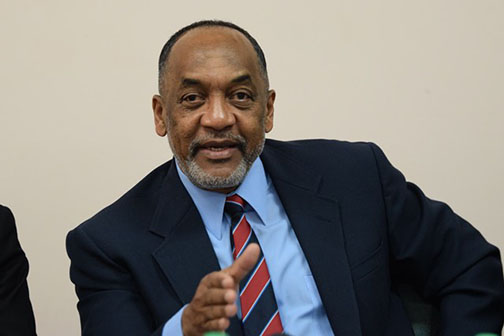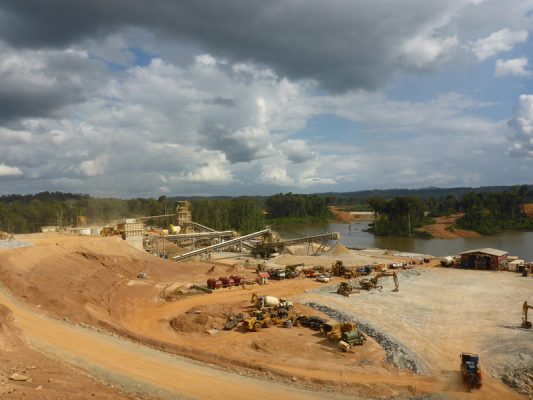On the heels of an announcement by Guyana Goldfields Inc. (GGI) that it has started underground work at its Aurora gold mine in Region Seven, the Environmental Protection Agency (EPA) has issued cease orders to the company as the necessary permit has not yet been granted.
“In spite of notice given to not commence activities, you have blatantly disregarded the Agency’s directives, and [have] been in direct contravention of the Agency’s laws and regulations,” the EPA wrote in a letter to the company, which was seen by Sunday Stabroek.
GGI’s Chief Executive Officer Scott Caldwell confirmed receipt of the letter.
Section 15 (1) of the Environmental Protection Act states, “Every person who fails to carry out an environmental impact assessment or who commences a project without obtaining an environmental permit as required under this Act or the regulations shall be guilty of an offence and shall be liable to penalties prescribed under the Act

“In the circumstance, you are hereby advised that all activities for operations development of an underground mine located at Aurora, Region No. 07 must be immediately ceased, until such time you are furnished with an Environmental Permit by the EPA,” the letter advised the company.
Caldwell said that the Canadian company has complied with the EPA and all works have ceased.
“We have complied one hundred percent with the EPA letter,” Caldwell, who was in Guyana last Friday and spoke with Sunday Stabroek, said.
“We will follow the letter one hundred percent with the EPA and we would with any governmental…and regulatory agency. We may not agree, but we will absolutely comply,” he added.
The underground operations are aimed at extracting more than 2 million ounces of gold. Aurora has a total gold resource of 6.25 million ounces in the measured and indicated categories, as well as an additional 1.79 million ounces in the inferred category.
The mine achieved commercial production in January, 2016 and produced 160,000 ounces of gold in 2017. To be able to move underground, Guyana Goldfields is investing more than US $120 million.
Disappointed
Caldwell had reported, during an earnings call on July 31st of this year, that the company had requested proposals from several international contracting groups to undertake underground works at the mine.

On November 9th, the company announced that it had started the underground works at Aurora.
“Guyana Goldfields Inc. (TSX: GUY) (the “Company”) is pleased to announce that the Company has commenced underground development at the Aurora Mine completing the first blast on the Mad Kiss portal,” a release on its website stated.
“The contractor will complete and reinforce the collar and extend the decline 200 metres to fulfil the scope of the early works phase. The Company expects this will be completed early in Q1, 2019,” it added.
The release quoted Caldwell as saying, “The blast is a key milestone marking the commencement of underground construction. The decline provides an ideal platform to potentially upgrade and expand the current underground resource and unlock the full potential of the Aurora deposit.”
But the public declaration before permission was granted did not sit well with the EPA, which had written to the company on October 24th and pointed out that an Environmental Impact Assessment (EIA) needed to be conducted before authorisation could be granted for the works.
When contacted, Dr. Vincent Adams, the new Head of the EPA, confirmed that he did read the announcement in the newspapers. He added that he was highly disappointed at the development given the company’s stature and especially since the agency previously directed by way of the October 24th letter that no developmental work must commence at the site without the proper authorisation by the agency.
Dr. Adams, who is also a Geological Engineer and Hydrologist, stated that as far as he knows, construction of deep underground mines for gold extraction would be new to the country and such an operation could have serious environmental implications for ground and surface water contamination, if not done properly. He thought it very reasonable and fair to the company and for the protection of the environment to ask it to do the technical analyses and submit a new EIA to address these new risks not covered in the original EIA.
Dr. Adams affirmed that the EPA’s requests are not only reasonable, but grounded in the laws of this land, and “no company is above such laws.”
Asked what action he intends to take, the EPA Head advised that his agency’s inspectors will be visiting the site very soon to make an assessment, which will determine its course of action. Options include legal recourse, including fines, and returning the land to its original state as necessary.
Paramount
Meanwhile, Minister of Natural Resources (MNR) Raphael Trotman said he has asked the head of the Guyana Geology and Mines Commission (GGMC) Newell Dennison to look into the matter. “Effectively, this is more of a matter for the GGMC than MNR so I am awaiting Mr. Dennison’s advice and recommendation,” he said.
Trotman said that the GGMC approved the mine plan but MNR and the GMMC have “no control over EPA, which is independent and has the right to call for a new or revised EIA.”
GGI had in September of this year applied to the EPA for a variance of its environmental authorisation but had been told that it will be required to conduct a revised EIA and Environmental Management Plan.
The EPA told the company that while it had submitted an application for Environmental Authorisation, it did not give them the right to commence any developments at the mine site. “Development of the Mine Site must only commence when an Environmental Authorisation and/or Permit is granted by the Agency,” it stated.
This newspaper understands that following GGI’s release that it was forging ahead with works, concerns were raised by environmentalists to the EPA about the possible ramifications the underground mining could have on the country’s water system.
Sources close to government have confirmed that while no formal correspondence was received from the public, “a letter from the EPA” highlighting the situation was received and it “knows of concerns raised.”
Among the concerns raised were that even though underground mining was being pioneered in the South American region through GGI’s works, no one looked at what could be the possible implications for this country’s river systems.
Dr. Adams would not confirm or deny if reports were received but stressed that he wanted it to be made clear that EPA’s decisions will be based upon sound science and the rule of law. “The Agency will always be very supportive of, and be accommodative of businesses, but will not allow any company to use business as a cloak to flout the Agency’s authority and the laws of the nation. People’s health and the environment are paramount to any company’s economics,” he said.





